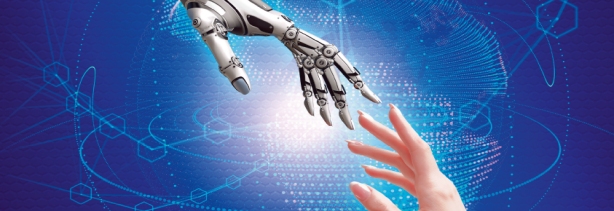
June 20, 2045. Sander Klous and Nart Wielaard have a meeting in a cafe in one of the Natural Zones in the business district of Amsterdam. Recently, these Natural Zones are gaining popularity as they guarantee their customers an isolated environment free of any kind of network technology. The name of the venue is “Room for coincidence” and underlines the promise: in this environment, people experience a temporary disconnection from their personal algorithms that guide them in their daily decisions, based on real-time data from approximately 3,000 data sources measuring their behavior. In fact, they get back to their instincts and their personal judgments. The Natural Zones are a costly experience for a happy few, at 20,000 CCC’s – CommonCryptoCoins ([Gree11]) – for 30 minutes. But the occasion is special. Sander is celebrating his official halftime life. Based on his genetic profile and his lifestyle data, Sander’s predicted life span is currently 143 years and 15 days. A good reason for celebration and an excellent excuse to have a few beers while pondering about the past.
N: “Good to see you Sander. It was an excellent suggestion from Katie, my digital butler, to schedule this in our calendars. It made me ponder about how we met more than 30 years ago and what has changed during these years. You actually had a secretary then, who scheduled appointments like these. Can you believe it?”
S: “I know. It’s hard to imagine. But you know, by then algorithms really were in their infancy. I even recall that people were showing of their smartphones as a status symbol. Who would have thought that 20 years later, students were spending all their money on the latest personal algorithms. Your Katie is powered by Lolli 3.2 isn’t she? Can’t see your hologram in this Natural Zone.”
N: “Yep. And point taken. I have never been a trendsetter in buying algo’s. You’ve upgraded to Lolli 4 I guess?”
S: “Sure did. Bought it from the royalties of the last VR experience ([Wit15]) we created. I must say that it’s a real treat: version 4 is a lot better in suggesting financial decisions. It has saved me quite a bit of money. The tailor made and continuously adapting portfolio to finance my new house in Haarlem has come a long way from what once started out as Crowd Funding ([Ment15]) initiatives. Which reminds me that when moving into the new house, I stumbled upon our first book. We Are Big Data ([Klou15]). Remember? A printed version. I started reading some parts of it and I must say that we weren’t all wrong. Data-analysis was sort of exotic back then. One of the challenges actually was getting access to the data. Can you imagine that? Nowadays, nearly all data is freely available for every machine with the right ethics module. In that book in 2015 we were already speculating about how blockchain technology ([Voor15]) would bring change not only in financial transactions but throughout the whole society.”
N: “I think its impact has been more fundamental than we suggested. It proved to be the foundation to solve major societal issues. It restored trust in many sectors, as we no longer have to put our faith in institutions. We had a giant industry of auditors and oversight bodies that failed to bring trustworthiness time and time again ([Pres12]). Look at the difference 30 years later. Trust now comes from the network, without any human involvement. A collective secure lock serving as the foundation of our current society. It has been an inevitable step to provide the transparency we need in a society that has moved beyond the technical singularity.”
S: “In hindsight, I think the signals were already there that the power of large institutions – both companies and governments – was crumbling. The power distribution in cyberspace was just not healthy, Elon Musk opening up his entire patent portfolio ([Musk14]) was the first sign. We should have realized much earlier that Silicon Valley was going to turn into a terrorist network just to protect their position against the upcoming artificial intelligence industry in African nations. Unfortunately we needed to experience the Ethereum ([Bute14]) crisis in 2030 before Google, Facebook and Tesla showed their real motives. It scared the hell out of me when this terrorist group seemed to be able to destabilize a collective network that we all thought could not be compromised. So glad the Chinese managed to upgrade and restore the protocols with the Africans. These self-driving cars ([Tesl15]) were making an even bigger mess than the emissions crisis ([Geie15]) that caused the bankruptcy of Volkswagen, Toyota and every other car manufacturer that couldn’t update their software over the air.”
N: “Hell yeah. We should never have elected Mark Zuckerberg for president.”
S: “A human president just has too many emotions, no matter who he or she is. One of the students in my team was actually part of his anarchist group, did you know that? Never expected that, she was such a nice girl. Apparently, they just wanted to show their skills and demonstrate that advanced decentralized intelligence released in cyberspace can result in disasters. Even when these machines operate within the ethical constraints as defined by the future of life institute after their open letter ([Tegm15]) got accepted by the United Nations Security Council. It reminds me of one of the statements you have been making ever since I first met you: new inventions and technological developments always have a bright and a dark side. Just like the invention of stone instruments long ago. It was very practical to improve daily life. But one could also use it to efficiently kill the neighbor. These two faces of inventions will keep on popping up with all future inventions. The fact that humans are no longer involved does not change that.”
N: “I think you’re right. We now have tailor made health insurances, with premiums based on our personal data and our DNA ([Loon15]). This has worked well for quite some years. However, now that we can design and alter DNA, this also offers potential for fraud. Some holograms try to mislead insurance companies with loop holes in the DNA of their host to cheat and get better propositions.”
S: “One more beer?”
N: “I’ll ask Katie if that fits within my current insurance plan. Wait, I forgot. She’s not around.”
References
[Bute14] V. Buterin, Ethereum: A Next-Generation Cryptocurrency and Decentralized Application Platform, Bitcoin Magazine, 2014, https://bitcoinmagazine.com/articles/ethereum-next-generation-cryptocurrency-decentralized-application-platform-1390528211
[Geie15] B. Geier, Everything to know about Volkswagen’s emission crisis, 2015, Fortune, http://fortune.com/2015/09/22/volkswagen-vw-emissions-golf/
[Gree11] A. Greenberg, Crypto Currency, Forbes, 2011, http://www.forbes.com/forbes/2011/0509/technology-psilocybin-bitcoins-gavin-andresen-crypto-currency.html
[Klou15] S. Klous and N. Wielaard, Wij zijn Big Data, 2015, Atlas Contact, http://www.atlascontact.nl/boek/wij-zijn-big-data/
[Loon15] J. van Loon, Place a bid, Cellout.me, 2015.
[Ment15] G. Menten, The business behind crowdfunding, Econible, 2015, http://www.econible.com/business-behind-crowdfunding/
[Musk14] E. Musk, All Our Patent Are Belong To You, Tesla, 2014, https://www.teslamotors.com/blog/all-our-patent-are-belong-you
[Pres12] Press Association, Financial crisis, five years on: trust in banking hits new low, The Guardian, 2012, http://www.theguardian.com/business/2012/aug/09/financial-crisis-anniversary-trust-in-banks
[Tegm15] M. Tegmark, Research priorities for robust and beneficial artificial intelligence, Future of Life Institute, 2015, http://futureoflife.org/ai-open-letter/
[Tesl15] Tesla, Model S Software Version 7.0, Press Release, 2015, https://www.teslamotors.com/presskit/autopilot
[Voor15] E. Voorhees, It’s all about the blockchain, Money and State, 2015, http://moneyandstate.com/its-all-about-the-blockchain/
[Wit15] B. de Wit and D. Kip, Documentary Making, Dutch VR days, 2015, http://dutchvrdays.nl/documentary-making/
Sander Klous is a professor in Big Data Ecosystems at the University of Amsterdam and Managing Director Big Data Analytics at KPMG Advisory. He is head of technology in the KPMG global leadership team on Data & Analytics.
Nart Wielaard is an independent consultant and business writer, specialized in the intersection of technology, society and business. With Sander Klous, he wrote the book Wij zijn Big Data (“We Are Big Data”).




